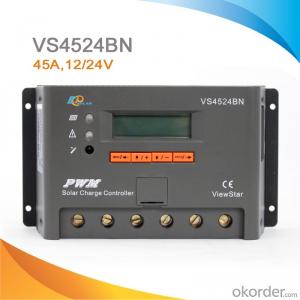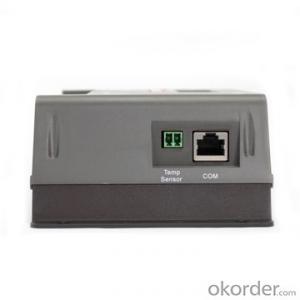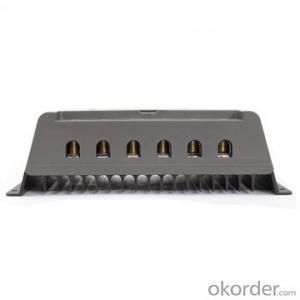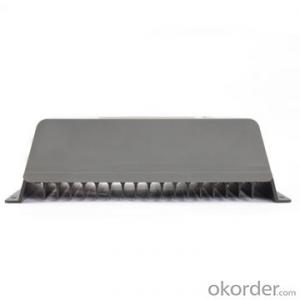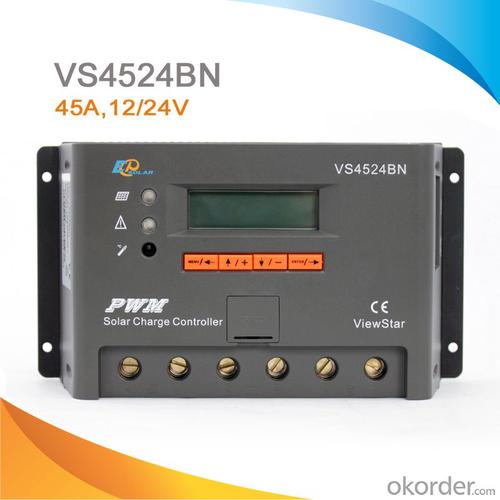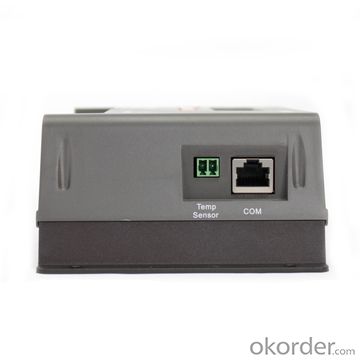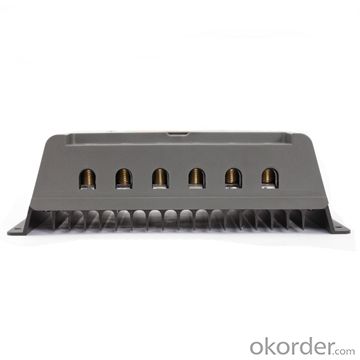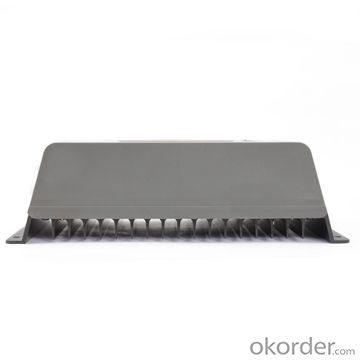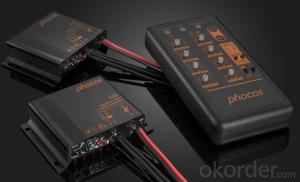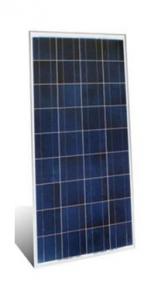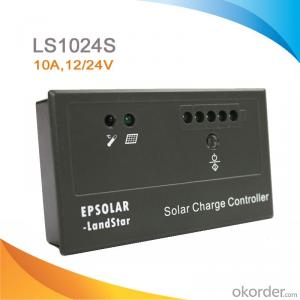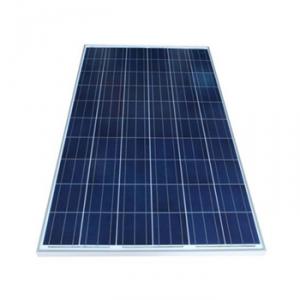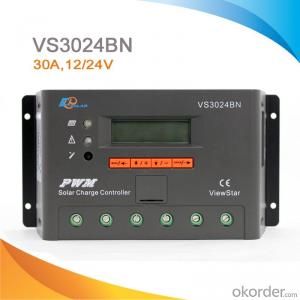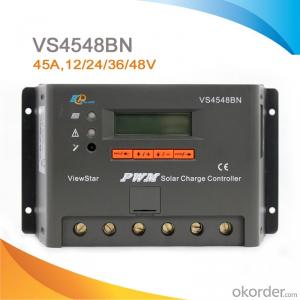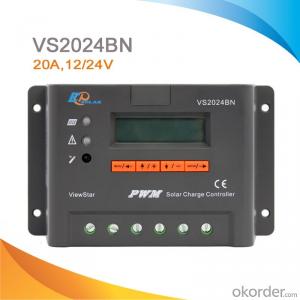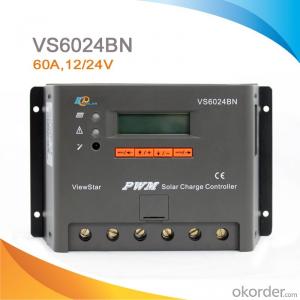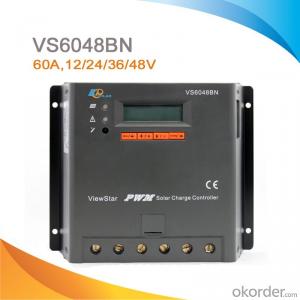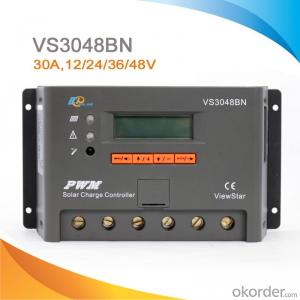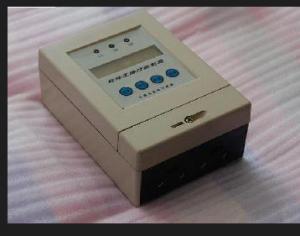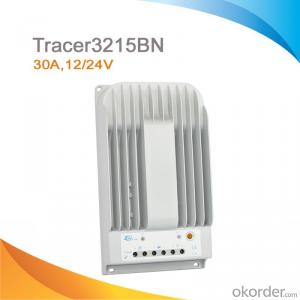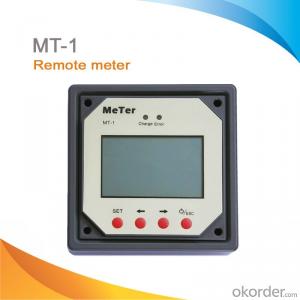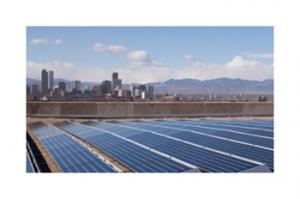Solar Panel Controllers - LCD/LED High Quality PWM Solar System Charge Controller/Regulator with CE ROHS, 45A 12V/24V, VS4524BN
OKorder Service Pledge
OKorder Financial Service
You Might Also Like
Features:
·Excellent EMC design
·32 bit MCU with high speed
·High efficient Series PWM charging
·Four battery type options: Sealed, Gel, Flooded, and USER
·Intelligent lighting and timer control for solar lighting system
·12 bit A/D high-precision sampling to ensure accuracy
·Use MOSFET as electronic switch
·Full control parameters setting and modification, diversified load control mode
·Humanized design of browser interface, undertake every operating conveniently
·Temperature compensation
·Adopt graphics dot-matrix LCD screen and HMI (human-machine interface) with 4 buttons,integrated menu displaying and operation
·Energy statistics function
·RS485 ports with MODBUS communication protocol
·Optional PC monitoring software and remote meter for real-time monitoring and battery management parameter setting
·Field upgradable firmware
Electronic Protections:
·PV short circuit protection
·PV reverse polarity protection
·Battery overcharge protection
·Battery over discharge protection
·Battery reverse polarity protection
·Load overload protection
·Load short circuit protection
·Overheating protection
Specification:
Model | VS1024BN | VS2024BN | VS3024BN | VS4524BN | VS6024BN |
Nominal system voltage | 12V/24V auto work | ||||
Rated battery current | 10A | 20A | 30A | 45A | 60A |
Rated load current | 10A | 20A | 30A | 45A | 60A |
Max. battery voltage | 32V | ||||
Equalize charging voltage | Sealed: 14.6V, Flooded: 14.8V, User-defined: 9~17V | ||||
Boost charging voltage | Gel: 14.2V, Sealed: 14.6V, Flooded: 14.8V, User-defined: 9~17V | ||||
Float charging voltage | Gel /Sealed /Flooded: 13.8V, User-defined: 9~17V | ||||
Low voltage reconnect voltage | Gel /Sealed /Flooded: 12.6V, User-defined: 9~17V | ||||
Low voltage disconnect voltage | Gel /Sealed /Flooded: 11.1V, User-defined: 9~17V | ||||
Self-consumption | ≤15mA(12V); ≤10mA(24V); ≤9mA(36V); ≤8mA(48V) | ||||
Grounding | Common negative | ||||
Temp. compensation | -3mV/°C/2V | ||||
Relative humidity | 10%~90% Non-condensation | ||||
Communication | RS485 / RJ45 interface | ||||
LCD temperature | -20°C ~ +70°C | ||||
Working temperature | -25°C ~ +55°C | ||||
Humidity | ≤95% N.C. | ||||
Enclosure | IP30 | ||||
Overall dimension | 162x85x40mm | 162x100x50mm | 200x103x58mm | 201x109x59mm | 205x129x67mm |
Terminals | 4mm2 | 10mm2 | 16mm2 | 35mm2 | 35mm2 |
Net weight | 0.2kg | 0.4kg | 0.7kg | 0.9kg | 1.3kg |
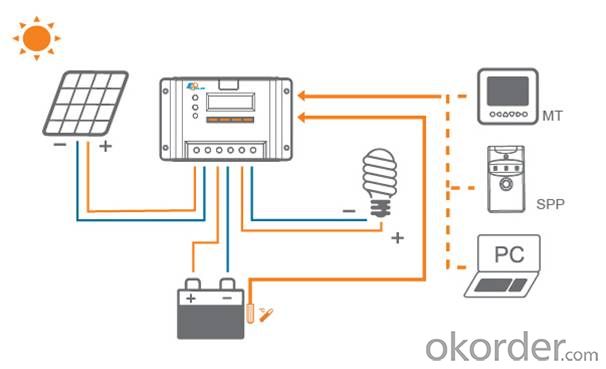
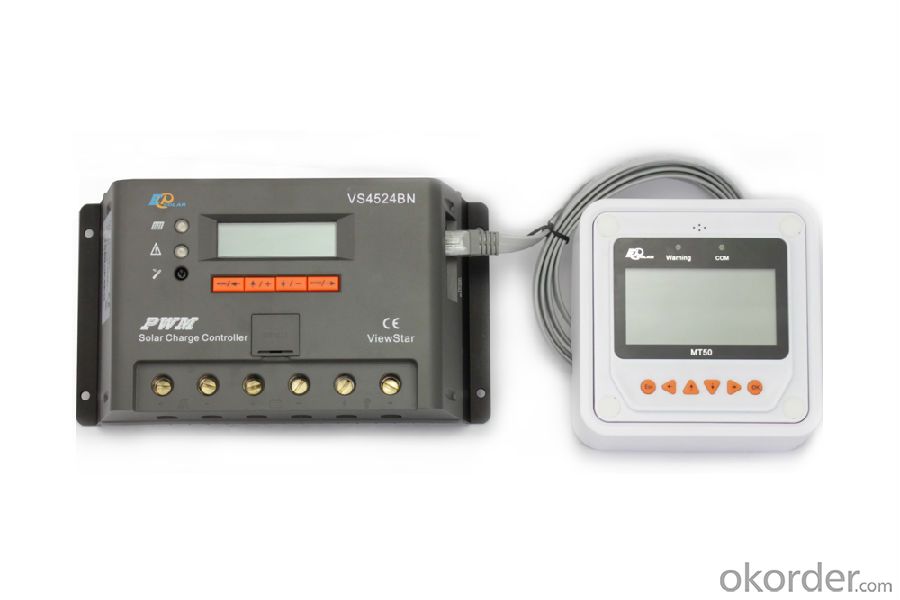
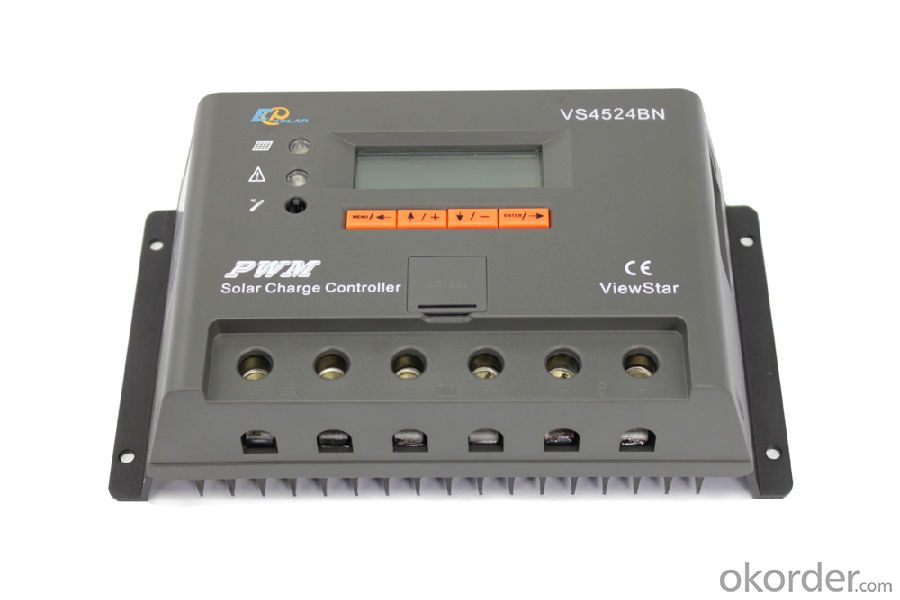
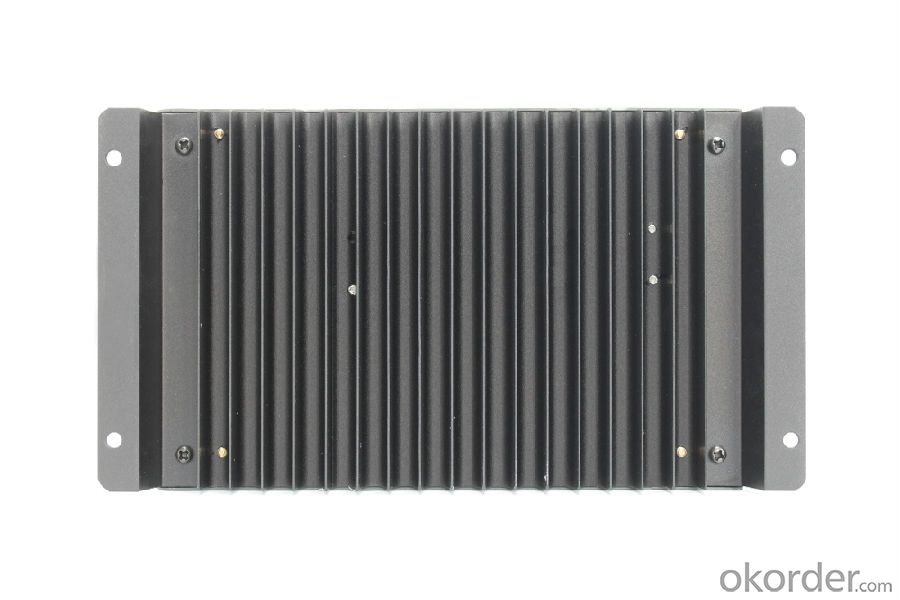
FAQ:
Q1. What is the voltage?
A1. Our 45/60A solar charge controller is 12/24/36/48V auto work.
Q2. What is the difference between MPPT&PWM?
A2. MPPT has higher efficiency, it can track the max power point and won't waste energy.
Q3. What is the efficiency of the MPPT controller?
A3. MPPT>99%, peak conversion efficiency>98%.
Q4. What is the waranty of product?
A4. 12 months.
Q5. What protection does your MPPT controller have?
A5. PV array short circuit, PV reverse polarity, Battery reverse polarity, Over charging, Output short circuit.
- Q: Can a solar controller be used with a solar-powered agricultural system?
- Yes, a solar controller can be used with a solar-powered agricultural system. A solar controller helps regulate and optimize the charging process of the solar panels, ensuring efficient power generation and preventing overcharging or damage to the batteries. It can also manage the distribution of power to various components of the agricultural system, such as water pumps, sensors, or irrigation systems, maximizing the use of solar energy and enhancing overall system performance.
- Q: Which is more efficient: PWM solar controller or MPPT solar controller?
- Solar power systems commonly use both PWM (Pulse Width Modulation) and MPPT (Maximum Power Point Tracking) solar controllers, but they exhibit different efficiency characteristics. Compared to MPPT controllers, PWM solar controllers are simpler and more cost-effective. They operate by rapidly switching the voltage of the solar panel on and off, resulting in an output that matches the battery voltage through pulsing. This method proves efficient when the solar panel voltage closely aligns with the battery voltage, allowing for a relatively high charging current. However, when the solar panel voltage greatly exceeds the battery voltage, PWM controllers experience a decrease in efficiency. This is due to the excess voltage being converted into heat, resulting in power loss. On the contrary, MPPT solar controllers prioritize maximizing the power output from the solar panels. They continuously adjust the load to locate the optimal operating voltage and track the maximum power point of the solar panel. Consequently, MPPT controllers can extract more power from the solar panels, particularly in scenarios where the solar panel voltage surpasses the battery voltage. This ability to match the panel voltage with the battery voltage enhances overall efficiency and optimizes the utilization of available solar power. To summarize, while PWM solar controllers prove more economical and efficient when the solar panel voltage is similar to the battery voltage, MPPT controllers offer higher efficiency and superior performance when the solar panel voltage significantly exceeds the battery voltage. Therefore, MPPT solar controllers are generally considered more efficient in most situations, particularly when dealing with larger solar power systems or when the solar panel voltage exhibits significant variations.
- Q: Can a solar controller handle different battery types (e.g., lead-acid, lithium)?
- Yes, a solar controller can handle different battery types such as lead-acid and lithium. However, it is important to note that not all solar controllers are designed to support all battery types. Different battery chemistries require specific charging algorithms and voltage settings. Therefore, it is crucial to choose a solar controller that is compatible with the specific battery type you intend to use.
- Q: Can a solar controller be used in a remote location where grid power is not available?
- Yes, a solar controller can be used in a remote location where grid power is not available. Solar controllers are designed to regulate and control the charging of batteries from solar panels. They do not rely on grid power and can function independently in off-grid locations. This makes them ideal for remote areas where access to electricity from the grid is not feasible.
- Q: Can a solar controller be used with a solar-powered remote monitoring system?
- Yes, a solar controller can be used with a solar-powered remote monitoring system. A solar controller helps regulate the charging process of batteries in a solar system, ensuring optimal performance and longevity. In the case of a solar-powered remote monitoring system, a solar controller would be necessary to manage and maintain the battery charge, allowing the system to operate efficiently and reliably.
- Q: What is the temperature rating of a solar controller?
- The temperature rating of a solar controller typically refers to the maximum and minimum temperatures at which the controller is designed to operate efficiently and effectively. The temperature rating will vary depending on the specific model and manufacturer, but in general, most solar controllers have a temperature rating between -20°C to 55°C (-4°F to 131°F). It is important to consider this temperature rating when selecting a solar controller for your system, as operating outside of the recommended temperature range can potentially lead to reduced performance or even damage to the controller.
- Q: Can a solar controller be used with solar panel boat mounts?
- Yes, a solar controller can definitely be used with solar panel boat mounts. A solar controller helps regulate the voltage and current coming from the solar panels to ensure the batteries are charged efficiently and protected from overcharging. It is an essential component that can be used with any type of solar panel installation, including boat mounts.
- Q: What is the purpose of the battery over-discharge protection feature on a solar controller?
- The battery over-discharge protection feature on a solar controller serves the purpose of safeguarding the battery from damage caused by excessive discharge. This feature ensures that the battery does not go below a specific voltage threshold, as over-discharging can result in irreversible harm, reduced capacity, and a shorter lifespan. Continuous monitoring of the battery voltage by solar controllers enables the activation of the over-discharge protection feature when the voltage reaches a predetermined low level. This feature effectively cuts off the power supply from the solar panels to the battery, preventing any further discharge. Consequently, the battery is protected from excessive drainage, which could otherwise lead to permanent damage. The implementation of battery over-discharge protection by solar controllers not only extends the battery's lifespan but also ensures optimal performance. This is particularly crucial in off-grid solar systems where batteries serve as the primary source of energy storage. Without this protection feature, the battery would be subjected to deep discharge cycles, resulting in decreased efficiency and overall system performance. In conclusion, the battery over-discharge protection feature on a solar controller serves to prevent battery damage, increase its lifespan, and maintain the efficiency of the solar system.
- Q: Can a solar controller be used with solar panel window mounts?
- Yes, a solar controller can be used with solar panel window mounts. The solar controller helps regulate the power output from the solar panel and ensures that the battery or power system is charged efficiently. Regardless of the mounting method, a solar controller is essential to ensure optimal performance and protection for the solar panel and connected devices.
- Q: Can a solar controller be used with a solar heating system?
- Yes, a solar controller can be used with a solar heating system. A solar controller is responsible for regulating and optimizing the performance of the solar heating system by managing the flow of heat transfer fluid, monitoring temperatures, and controlling pumps or valves. It helps maximize the efficiency and effectiveness of the solar heating system by ensuring that the collected solar energy is properly utilized for heating purposes.
Send your message to us
Solar Panel Controllers - LCD/LED High Quality PWM Solar System Charge Controller/Regulator with CE ROHS, 45A 12V/24V, VS4524BN
OKorder Service Pledge
OKorder Financial Service
Similar products
Hot products
Hot Searches
Related keywords
